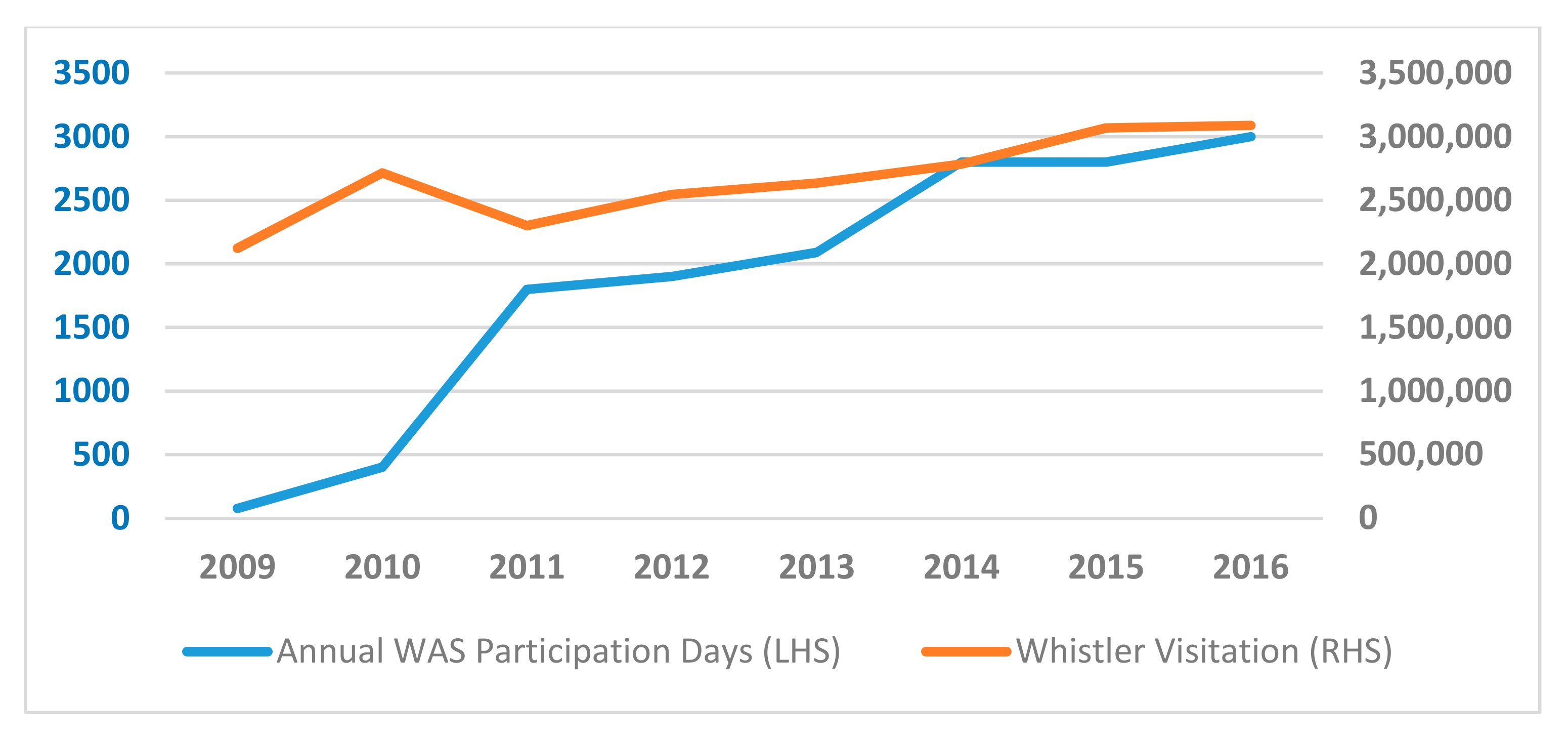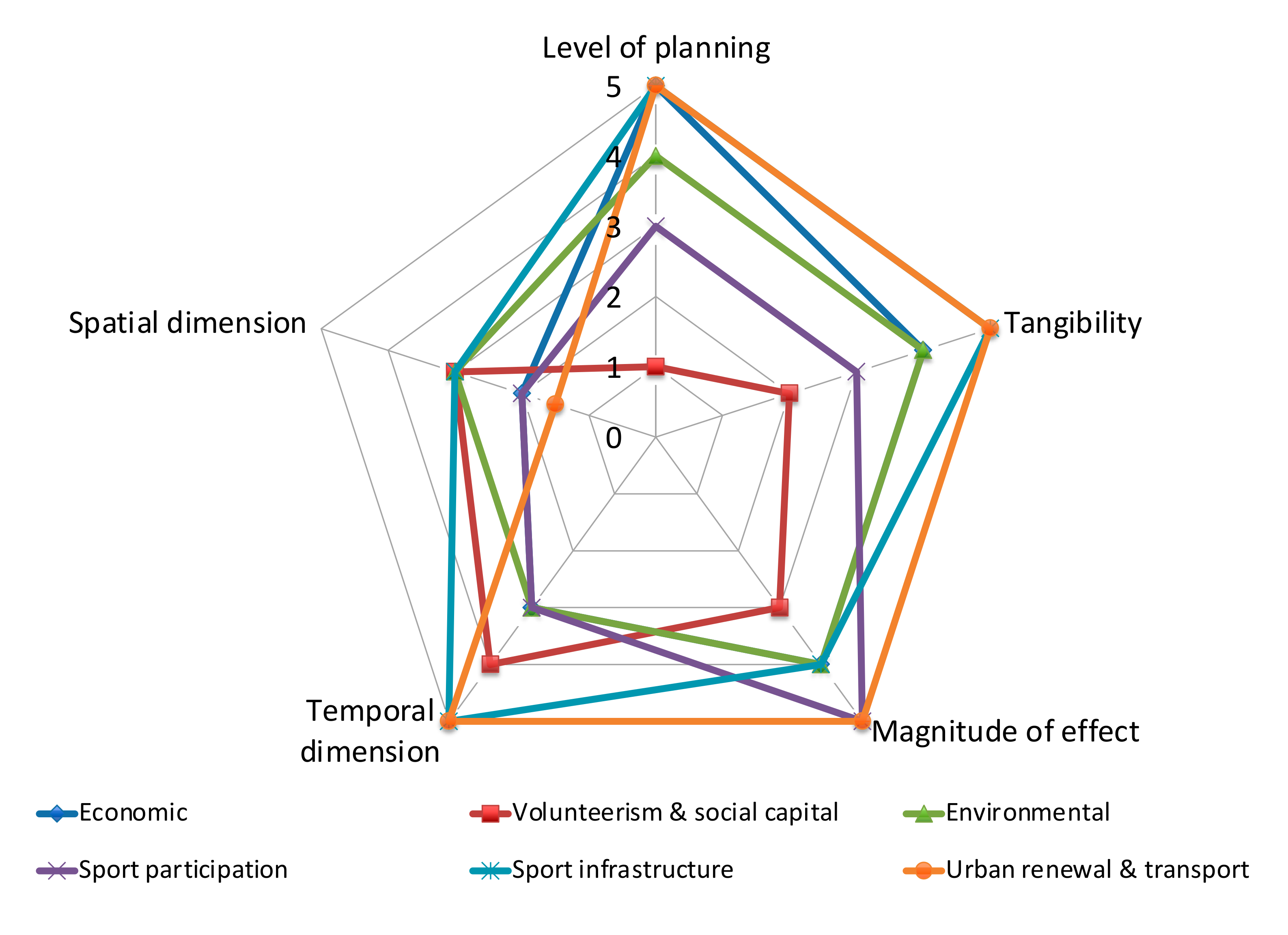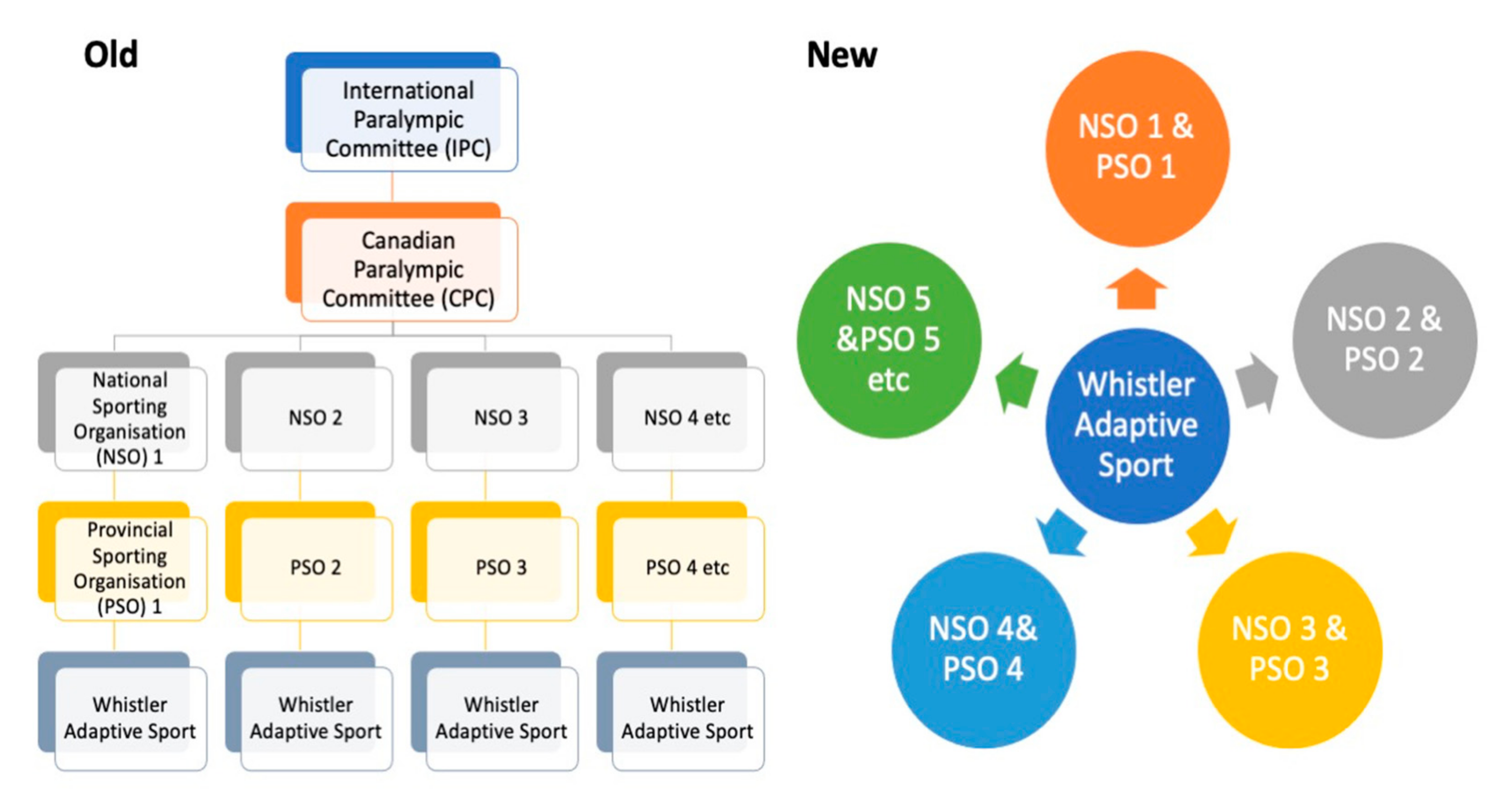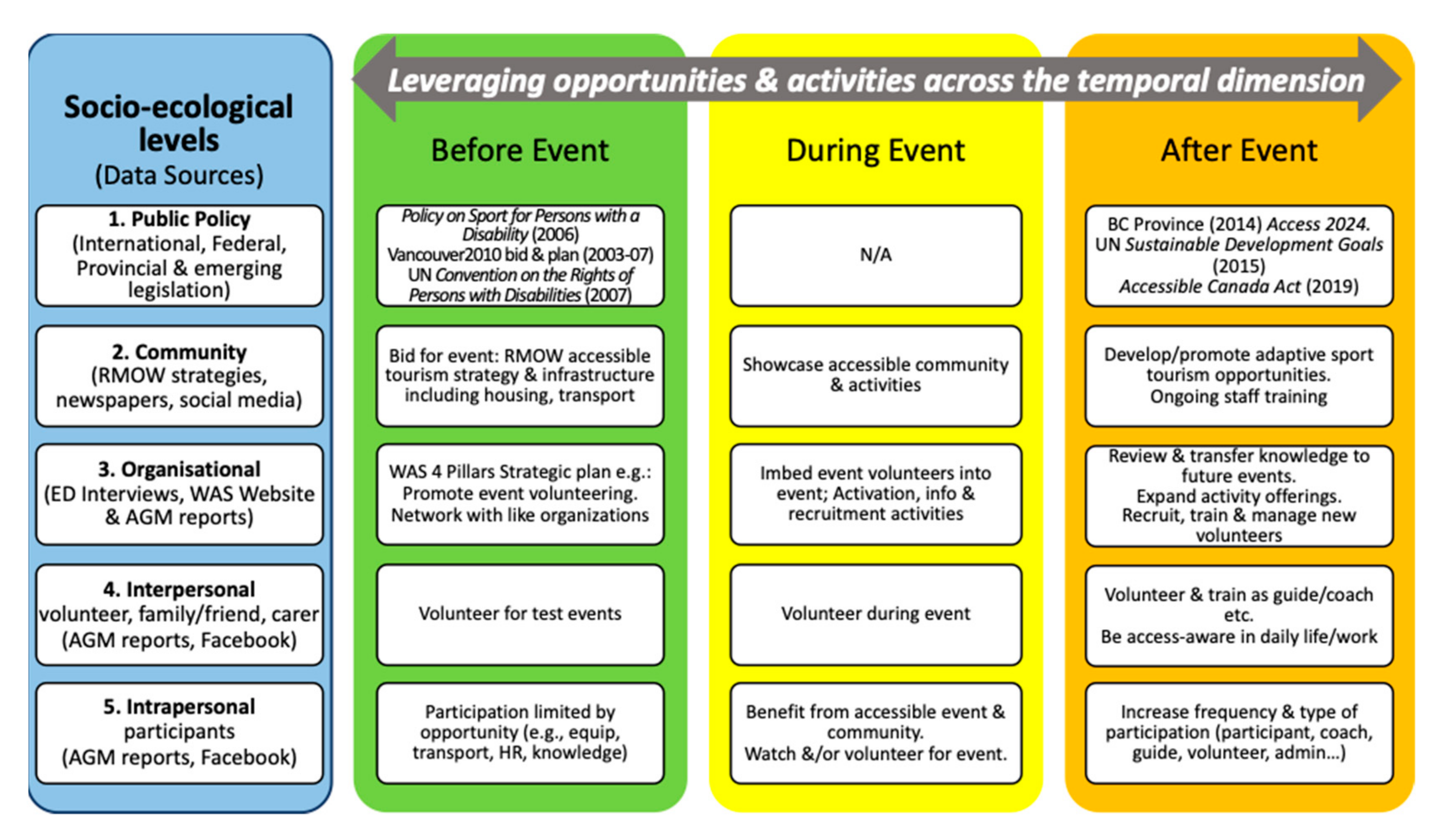A Case of Leveraging a Mega-Sport Event for a Sport Participation and Sport Tourism Legacy: A Prospective Longitudinal Case Study of Whistler Adaptive Sports
Abstract
1. Introduction
1.1. Theoretical Framework
1.1.1. Legacies and Leverage
1.1.2. Adaptive Sport and Participation Constraints
1.2. The Conceptual Framework for Analysis: Socioecological and Temporal
1.3. Research Question
2. Methods
2.1. Analysis
2.2. Research Context
3. Results
3.1. Macro Level: Public Policy
3.1.1. Policy Framework: International, Federal, and Provincial
3.1.2. The Auspicing Body: International Paralympic Committee (IPC)
- Accessible infrastructure in sport facilities and overall urban development.
- Development of sport structures/organizations for PwD, from grassroots to elite level.
- Attitudinal changes in the perception of the position and the capabilities of persons with a disability as well as in the self-esteem of the PwD.
- Opportunities for PwD to become fully integrated in social living and to reach their full potential in aspects of life beyond sports [5].
3.1.3. The Enabling Body: The Vancouver Organizing Committee for the 2010 Olympic and Paralympic Winter Games (VANOC)
“The central theme of bidding for and hosting [Vancouver2010] is to create sustainable legacies … VANOC’s goal is to leave legacies—physical and human—that will last long after the final medal of the Games is awarded …. Increased awareness of Paralympic sport and athletes … Creation of barrier-free access to sport and community facilities”.[92] (pp. 34–35)
“the village’s legacy would be non-market housing, and 216 permanent rooms (… 50 percent would be … completely accessible…), for athletes to train and to support the hosting of future World Cup events following the Games”.[93] (p. 7)
“Disability awareness training is key to effective and comfortable interaction with PwD and this opportunity will be provided to all paid staff, volunteers, and security personnel involved with the Vancouver OCOG. Disability awareness training has already been provided to all staff and volunteers involved with the … Bid Corporation”.[81] (p. 181)
3.2. Meso Level: Community of Whistler
a highly accessible pedestrian-oriented village … offers excellent services for PwD … by 2010 Whistler’s public transit system should be 100% accessible. All venues built … will meet or exceed the provincial or national building code accessibility requirements. Funds have been dedicated in the Vancouver OCOG budget specifically for accessibility enhancements for all new venues.[81] (p. 5)
3.2.1. Meso Level: Organization—Whistler Adaptive Sports
year-around, recreational programs for people of all ages with disabilities … a centre for learning and sports excellence that has a local, regional, national and international clientele and encourage independence, self-confidence and self-motivation for all of our athletes and participants through outdoor recreation (http://www.whistleradaptive.com).
3.2.2. Changing Perceptions of Relationship with PSOs and NSOs
3.2.3. Broadening Vision and Leadership
3.2.4. Pre-Event: Strategic Planning for the Future: 4 Pillars
- Volunteer and staffing: WAS worked with VANOC to place volunteers in test events to gain experience. Most of the 160 games-time volunteers were from WAS, those who did not have a prior connection to WAS were encouraged to join. To keep volunteers engaged post-games the key was “to steward our volunteers” [56]. As Whistler has a highly transient population ongoing recruitment and training of new volunteers is required.
- Marketing and media: “To keep the interest in Paralympics sports we need to continue to attract high level sports” [56]. Thus, a strategic plan was developed to attract future events beyond 2010 to facilitate brand-awareness and sponsorship attractiveness [55]. WAS’s success in raising their brand and product awareness is reflected in not needing to advertise to attract more clients as demand growth outpaces their ability to supply due to volunteer and equipment resource limits, resulting in waitlists for lessons [60].
- Infrastructure. Linked to the fully accessible public transport system by the time of Vancouver2010 and the Athletes’ Village design with 40% accessible rooms and 25% with wheel-in showers, post-event WAS had a free office for at least 5 years, and access to accessible accommodation to support training and adaptive sport tourism [55,97].
- Funding to enhance programming. Leveraging awareness that investment in parasports is a whole-of-life investment which can decrease health costs for parasports participants underpins knowing your political advantage. This required WAS to develop efficiencies: “cross-pollination for volunteers and resources, e.g., mountain biking and Nordic uses the same timing systems” [56]. Further knowing your competitive advantage is essential: “For sport tourism we focused on what we do well, wintersports, outdoor aerobic (mountain biking, running), parasports” [56].
3.2.5. Post-Event: Product Innovation, Partnerships, and Sponsorships
3.3. Micro Level
3.3.1. Interpersonal Factors
3.3.2. Individual/Participants
“I was canoeing & skiing before June 2016, when I suffered a stroke. Overnight I could not do anything. Now I have an adaptive paddle so I can canoe again—not well but I am on the water. I have learned to swim with one arm. Now I want to ski again”.(FB#1)
“At first, I was disappointed when I was told that my special need son cannot be in the regular ski school and have to be in the adaptive program. I was totally blown away with the Adaptive program that is specially designed for people like him. He enjoyed every bit of it and still talks about the ski trip after a month of being home. The staff as well as the volunteers were so nice, accommodating, and most of all, I am surprised with everything that he has learn in just the 3 days we were there”.(FB#2)
“thank you so much! … I am so deeply grateful for your time and energy. Thanks to the great work you are doing helping more youth enjoy the satisfaction of participating in sport”.(FB#71)
“it was 2 years ago today that after 10 years of lobbying for, and participating in adapted snowboarding, we competed at the Paralympic games. I am so proud to be a part of it! Thank you for all your support”.(FB#84)
“We made an early season trip to the mountain in a fit of spontaneity. It was 5 of what will be 6 trips in 5 years. One of the primary things that keeps our merry band coming back is that WASP reinvigorated our brother and pal … in terms of skiing. He’s taken to enjoying it so much, and our whole group of family/friends look forward to bonding together on the hill. We bumped into his very first instructor (the ReMotivator!) … and caught sight of two other instructors we’ve had over 5 years. This all speaks to the consistency of good and skilled people you have there, and why you have at least one returning learner every year. Thanks so much for all you do. All of you”.(FB#106)
“Thank you … for seeing a need here and help push for grants for these bikes. I think we’re onto something and without all of you this weekend wouldn’t have been possible. It takes a cohesive, loving, adventurous group to make things run smooth and you nailed it!”.(FB#25)
The outcomes of an activity provided a focus for individuals who otherwise wouldn’t have had the experience and the activity becomes part of their lives to the point of one person stating that the program and WAS was “my happy place”.(FB#85)
3.4. Temporal Extension of the Socioecological Framework (TESEF)
4. Discussion
4.1. Challenges for the Future
4.2. Study Limitations
5. Conclusions
Author Contributions
Funding
Institutional Review Board Statement
Informed Consent Statement
Data Availability Statement
Conflicts of Interest
References
- Weed, M.; Coren, E.; Fiore, J.; Wellard, I.; Chatziefstathiou, D.; Mansfield, L.; Dowse, S. The Olympic Games and raising sport participation: A systematic review of evidence and an interrogation of policy for a demonstration effect. Eur. Sport Manag. Q. 2015, 15, 195–226. [Google Scholar] [CrossRef]
- Craig, C.L.; Bauman, A.E. The impact of the Vancouver Winter Olympics on population level physical activity and sport participation among Canadian children and adolescents: Population based study. Int. J. Behav. Nutri. Phys. Act. 2014, 11, 107. [Google Scholar] [CrossRef] [PubMed]
- Feng, J.; Hong, F. The legacy: Did the Beijing Olympic Games have a long-term impact on grassroots sport participation in Chinese townships? Int. J. His. Sport 2013, 30, 407–421. [Google Scholar] [CrossRef]
- Veal, A.J.; Toohey, K.M.; Frawley, S. The sport participation legacy of the Sydney 2000 Olympic Games and other international sporting events hosted in Australia. J. Policy Res. Tour. Leis. Event 2012, 4, 155–184. [Google Scholar] [CrossRef]
- IPC. Section 1 Chapter 3 Paralympic Games Chapter. In IPC Handbook; International Paralympic Committee (IPC): Bonn, Germany, 2007; pp. 1–43. [Google Scholar]
- Thompson, W.R.; Vanlandewijck, Y.C. Perspectives on research conducted at the Paralympic Games. Disabil. Rehabil. 2020. [Google Scholar] [CrossRef] [PubMed]
- Dickson, T.J.; Misener, L.; Darcy, S. Enhancing destination competitiveness through disability sport event legacies: Developing an interdisciplinary typology. Int. J. Contemp. Hosp. Manag. 2017, 29, 924–946. [Google Scholar] [CrossRef]
- Misener, L.; Darcy, S. Managing Disability Sport: From athletes with disabilities to inclusive organisational perspective. Sport Manag. Rev. 2014, 17, 1–7. [Google Scholar] [CrossRef]
- Jaarsma, E.; Dijkstra, P.; Geertzen, J.; Dekker, R. Barriers to and facilitators of sports participation for people with physical disabilities: A systematic review. Scand. J. Med. Sci. Sports 2014, 24, 871–881. [Google Scholar] [CrossRef]
- Dickson, T.J. How to Apply A Strategic Approach to Delivering Legacies from Hosting Mega Sport Events. Available online: https://www.chrie.org/files/0012018_Dickson.pdf (accessed on 15 July 2019).
- Whitehead, M. Physical Literacy: Throughout the Lifecourse; Routledge: London, UK, 2010. [Google Scholar]
- Darcy, S.; Dickson, T.J. A whole-of-life approach to tourism: The case for accessible tourism experiences. J. Hosp. Tour. Manag. 2009, 16, 24–31. [Google Scholar] [CrossRef]
- Dickson, T.J.; Darcy, S. A question of time: A brief systematic review and temporal extension of the socioecological framework as applied in sport and physical activity. Transl. Sport Med. 2020, 1–11. [Google Scholar] [CrossRef]
- Henderson, K.A. A paradox of sport management and physical activity interventions. Sport Manag. Rev. 2009, 12, 57–65. [Google Scholar] [CrossRef]
- Bronfenbrenner, U. The Ecology of Human Development; Harvard University Press: Cambridge, MA, USA, 1979. [Google Scholar]
- Sallis, J.F.; Owen, N. Ecological models of health behavior. In Health Behavior: Theory, Research, and Practice, 5th ed.; Glanz, K., Rimer, B.K., Viswanath, K., Eds.; Jossey-Bass: San Francisco, CA, USA, 2015; pp. 43–64. [Google Scholar]
- Bronfenbrenner, U. Ecological Systems Theory; Jessica Kingsley: London, UK, 1992. [Google Scholar]
- De Bosscher, V.; De Knop, P.; Van Bottenburg, M.; Shibli, S. A conceptual framework for analysing sports policy factors leading to international sporting success. Eur. Sport. Manag. Q. 2006, 6, 185–215. [Google Scholar] [CrossRef]
- Carmichael, F.; Grix, J.; Marqués, D.P. The Olympic legacy and participation in sport: An interim assessment of Sport England’s Active People Survey for sports studies research. Int. J. Sport Policy Polit. 2012, 5, 229–244. [Google Scholar] [CrossRef]
- Chalip, L.; Green, B.C.; Taks, M.; Misener, L. Creating sport participation from sport events: Making it happen. Int. J. Sport Policy Polit. 2017, 9, 257–276. [Google Scholar] [CrossRef]
- Misener, L. Leveraging parasport events for community participation: Development of a theoretical framework. Eur. Sport Manag. Q. 2015, 15, 132–153. [Google Scholar] [CrossRef]
- Gillovic, B.; McIntosh, A. Accessibility and Inclusive Tourism Development: Current State and Future Agenda. Sustainability 2020, 12, 9722. [Google Scholar] [CrossRef]
- Gillovic, B.; McIntosh, A.; Cockburn-Wootten, C.; Darcy, S. Having a voice in inclusive tourism research. Ann. Tour. Res. 2018, 71, 54–56. [Google Scholar] [CrossRef]
- Dickson, T.J.; Darcy, S.; Pentifallo Gadd, C. Ensuring volunteer impact, legacy and leveraging is not “fake news”: Lessons from the 2015 FIFA Women’s World Cup. Int. J. Contemp. Hosp. Manag. 2020, 32, 683–705. [Google Scholar] [CrossRef]
- Chalip, L. From legacy to leverage. In Leveraging Legacies from Sports Mega-Events: Concepts and Cases; Grix, J., Ed.; Springer: Basingstoke, UK, 2014; pp. 2–12. [Google Scholar]
- Cashman, R.; Horne, J. Managing Legacy. In Managing the Olympics; Frawley, S., Adair, D., Eds.; Palgrave Macmillan: London, UK, 2013; pp. 50–65. [Google Scholar] [CrossRef]
- Dickson, T.J.; Benson, A.M.; Blackman, D.A. Developing a framework for evaluating Olympic and Paralympic legacies. J. Sport Tour. 2011, 16, 285–302. [Google Scholar] [CrossRef]
- Misener, L. Managing Legacy and the Paralympic Games. In Managing the Paralympic Games; Darcy, S., Frawley, S., Adair, D., Eds.; Palgrave Macmillan: Basingstoke, UK, 2017. [Google Scholar]
- Dickson, T.J.; Terwiel, F.A.; Buick, F. Paralympic Volunteer Management. In Managing the Paralympic Games; Darcy, S., Frawley, S., Adair, D., Eds.; Palgrave Macmillan: Basingstoke, UK, 2017; pp. 193–216. [Google Scholar]
- Taks, M.; Green, B.C.; Misener, L.; Chalip, L. Evaluating sport development outcomes: The case of a medium-sized international sport event. Eur. Sport Manag. Q. 2014, 14, 213–237. [Google Scholar] [CrossRef]
- Chalip, L. Towards Social Leverage of Sport Events. J. Sport Tour. 2006, 11, 109–127. [Google Scholar] [CrossRef]
- Chalip, L. Trading legacy for leverage. In Legacies of Mega Events: Fact or Fairy Tales; Brittain, I., Bocarro, J., Byers, T., Swart, K., Eds.; Routledge: London, UK, 2018; pp. 25–42. [Google Scholar]
- Winnick, J.; Porretta, D. (Eds.) Adapted Physical Education and Sport, 6th ed.; Human Kinetics: Champaign, IL, USA, 2016. [Google Scholar]
- Darcy, S.; Frawley, S.; Adair, D. The Paralympic Games: Managerial and Strategic Directions. In Managing the Paralympics; Palgrave MacMillan: Basingstoke, UK, 2017; pp. 1–19. [Google Scholar]
- McColl, M.A.; Schaub, M.; Sampson, L.; Hong, K. A Canadians with Disabilities Act? Available online: http://www.ccdonline.ca/en/socialpolicy/fda/cda (accessed on 7 September 2020).
- UN. Convention on the Rights of Persons with Disabilities; United Nations (UN) General Assembly A/61/611: New York, NY, USA, 2006. [Google Scholar]
- Jackson, E.L.; Crawford, D.W.; Godbey, G. Negotiation of leisure constraints. Leis. Sci. 1993, 15, 1–11. [Google Scholar] [CrossRef]
- Crawford, D.W.; Godbey, G. Reconceptualizing barriers to family leisure. Leis. Sci. 1987, 9, 119–127. [Google Scholar] [CrossRef]
- Crawford, J.L.; Stodolska, M. Constraints Experienced by Elite Athletes with Disabilities in Kenya, with Implications for the Development of a New Hierarchical Model of Constraints at the Societal Level. J. Leis. Res. 2008, 40, 128–155. [Google Scholar] [CrossRef]
- Darcy, S.; Ollerton, J.; Grabowski, S. “Why Can’t I Play?”: Transdisciplinary Learnings for Children with Disability’s Sport Participation. Soc. Incl. 2020, 8, 209–223. [Google Scholar] [CrossRef]
- Darcy, S.; Lock, D.; Taylor, T. Enabling inclusive sport participation: Effects of disability and support needs on constraints to sport participation. Leis. Sci. 2017, 39, 20–41. [Google Scholar] [CrossRef]
- McKercher, B.; Darcy, S. Re-conceptualizing barriers to travel by people with disabilities. Tour. Manag. Perspect. 2018, 26, 59–66. [Google Scholar] [CrossRef]
- Sotiriadou, K.; Wicker, P. Examining the participation patterns of an ageing population with disabilities in Australia. Sport Manag. Rev. 2014, 17, 35–48. [Google Scholar] [CrossRef]
- Dickson, T.J.; Darcy, S.; Johns, R.; Pentifallo, C. Inclusive by design: Transformative services and sport-event accessibility. Serv. Ind. J. 2016, 36, 532–555. [Google Scholar] [CrossRef]
- RMOW. Whistler’s Journey towards Accessibility; Resort Municipality of Whistler (RMOW): Whistler, BC, Canada, 2010.
- RMOW. Development of RMOW Accessibility Policy. In Administrative Report to Council; Resort Municipality of Whistler (RMOW): Whistler, BC, Canada, 2020. [Google Scholar]
- Sallis, J.F.; Cervero, R.B.; Ascher, W.; Henderson, K.A.; Kraft, M.K.; Kerr, J. An ecological approach to creating active living communities. Annu. Rev. Public Health 2006, 27, 297–322. [Google Scholar] [CrossRef]
- Wicker, P.; Hallmann, K.; Breuer, C. Micro and macro level determinants of sport participation. Sport Bus. Manag. 2012, 2, 51–68. [Google Scholar] [CrossRef]
- Hoekman, R.; Breedveld, K.; Kraaykamp, G. Sport participation and the social and physical environment: Explaining differences between urban and rural areas in the Netherlands. Leis. Stud. 2017, 36, 357–370. [Google Scholar] [CrossRef]
- Eime, R.M.; Casey, M.M.; Harvey, J.T.; Sawyer, N.A.; Symons, C.M.; Payne, W.R. Socioecological factors potentially associated with participation in physical activity and sport: A longitudinal study of adolescent girls. J. Sci. Med. Sport 2015, 18, 684–690. [Google Scholar] [CrossRef] [PubMed]
- Lewin, K. Frontiers in Group Dynamics. Hum. Relat. 1947, 1, 5–41. [Google Scholar] [CrossRef]
- Veal, A.J.; Darcy, S. Research Methods for Sport Studies and Sport Management: A Practical Guide, 1st ed.; Routledge: Milton Park, UK, 2014. [Google Scholar]
- Yin, R.K. Case Study Research: Design and Methods, 5th ed.; Sage Publishers: Thousand Oaks, CA, USA, 2009. [Google Scholar]
- Leonard-Barton, D. A Dual Methodology for Case Studies: Synergistic Use of a Longitudinal Single Site with Replicated Multiple Sites. Organ. Sci. 1990, 1, 248–266. [Google Scholar] [CrossRef]
- Walker, C. (Whistler Adaptive Sports, Whistler V8E 0K3, BC, Canada). Interview, 2009.
- Walker, C. (Whistler Adaptive Sports, Whistler V8E 0K3, BC, Canada). Interview, 2010.
- Walker, C. (Whistler Adaptive Sports, Whistler V8E 0K3, BC, Canada). Interview, 2012.
- Walker, C. (Whistler Adaptive Sports, Whistler V8E 0K3, BC, Canada). Interview, 2014.
- Walker, C. (Whistler Adaptive Sports, Whistler V8E 0K3, BC, Canada). Interview, 2016.
- Walker, C. (Whistler Adaptive Sports, Whistler V8E 0K3, BC, Canada). Interview, 2019.
- WASP. Annual General Meeting Information Package; Whistler Adaptive Sports Program Society (WASP): Whistler, BC, Canada, 2010. [Google Scholar]
- WASP. Annual General Meeting Information Package; Whistler Adaptive Sports Program Society (WASP): Whistler, BC, Canada, 2011. [Google Scholar]
- WASP. Annual General Meeting Information Package; Whistler Adaptive Sports Program Society (WASP): Whistler, BC, Canada, 2012. [Google Scholar]
- WASP. Annual General Meeting Information Package; Whistler Adaptive Sports Program Society (WASP): Whistler, BC, Canada, 2013. [Google Scholar]
- WASP. Annual General Meeting Information Package; Whistler Adaptive Sports Program Society (WASP): Whistler, BC, Canada, 2016. [Google Scholar]
- WASP. Annual General Meeting Information Package; Whistler Adaptive Sports Program Society (WASP): Whistler, BC, Canada, 2019. [Google Scholar]
- WASP. Annual General Meeting Information Package; Whistler Adaptive Sports Program Society (WASP): Whistler, BC, Canada, 2014. [Google Scholar]
- WASP. Annual General Meeting Information Package; Whistler Adaptive Sports Program Society (WASP): Whistler, BC, Canada, 2015. [Google Scholar]
- Blackman, D.A.; Benson, A.M.; Dickson, T.J. Enabling event volunteer legacies: A knowledge management perspective. Event Manag. 2017, 21, 223–250. [Google Scholar] [CrossRef]
- Accessibility 2024. Available online: https://www.youtube.com/watch?v=2e6BAFCD3MM (accessed on 25 September 2017).
- Government of Canada. Consulting with Canadians on Accessibility Legislation. Available online: https://www.canada.ca/en/employment-social-development/programs/disability/consultations/accessibility-legislation.html (accessed on 20 January 2017).
- RMOW. 2010 Olympic and Paralympic Winter Games Strategic Framework, Version 1; Resort Municipality of Whistler (RMOW), 2010 Winter Games Office: Whistler, BC, Canada, 2006.
- Osburn, E. Paralympic legacies are legacies for life: Hosting the Paralympic Games in 2010 made Whistler more accessible for everyone. Pique News Magazine, 6 March 2014. [Google Scholar]
- Mitchell, A. New home for Whistler’s adaptive ski program opens. Pique News Magazine, 31 December 2020. [Google Scholar]
- RMOW. Whistler 2020—Moving toward a Sustainable Future. Available online: http://www.whistlercentre.ca/sumiredesign/wp-content/uploads/2014/02/Whistler2020-Vision.pdf (accessed on 21 April 2018).
- Editor. Leisure buddies approved. In The Chief/Squamish Chief; Glacier Media Group: Squamish, BC, Canada, 2017. [Google Scholar]
- Burke, D. Whistler Adaptive Sports Program Turns 20. Available online: http://s-cdnsrc.dashdigital.com/whistler/winter_2019?article_id=1451339&pg=1#pg1 (accessed on 27 August 2020).
- Miles, M.B.; Huberman, A.M. The Qualitative Researcher’s Companion; SAGE: London, UK, 2002. [Google Scholar]
- Strauss, A.; Corbin, J. Basics of Qualitative Research: Procedures and Techniques for Developing Grounded Theory, 2nd ed.; SAGE: Thousand Oaks, CA, USA, 1998. [Google Scholar]
- Flyvbjerg, B. Five Misunderstandings About Case-Study Research. Qual. Inq. 2006, 12, 219–245. [Google Scholar] [CrossRef]
- Vancouver 2010 Bid Corporation. Vancouver 2010 Bid Book; Vancouver 2010 Bid Corporation: Vancouver, BC, Canada, 2003. [Google Scholar]
- RMOW. Whistler Visitation. Available online: https://www.whistler.ca/municipal-gov/community-monitoring/whistler-facts-and-figures/whistler-visitation (accessed on 15 April 2020).
- Pique Newsmagazine Staff. Museum Expanding with Online Exhibit of Olympic Bids. Pique News Magazine, 27 May 2003. [Google Scholar]
- Darcy, S. The politics of disability and access: The Sydney 2000 Games experience. Disabil. Soc. 2003, 18, 737–757. [Google Scholar] [CrossRef]
- Government of Canada. Policy on Sport for Persons with a Disability. Available online: http://canada.pch.gc.ca/eng/1414513635858/1414513676681 (accessed on 28 May 2016).
- Government of Canada. Promoting Rights of Persons with Disabilities. Available online: https://www.international.gc.ca/world-monde/issues_development-enjeux_developpement/human_rights-droits_homme/rights_disabilities-droits_handicapees.aspx?lang=eng (accessed on 27 August 2020).
- Province of British Columbia. Accessibility 2024: Making B.C. the Most Progressive Province in Canada for People with Disabilities by 2024; Province of British Columbia: Victoria, BC, Canada, 2014. Available online: http://www2.gov.bc.ca/gov/DownloadAsset?assetId=4E4879D2986E4E8CB3F6F757F59978D5&filename=accessibility2024_update_web.pdf (accessed on 15 June 2015).
- Province of British Columbia. Accessibility 2024: Making B.C. the most progressive province in Canada for people with disabilities by 2024. In June 2015 One Year Progress Update; Province of British Columbia: Victoria, BC, Canada, 2015. Available online: http://www2.gov.bc.ca/assets/gov/government/about-the-bc-government/accessible-bc/accessibility-2024/docs/accessibility2024-1-year-progress.pdf (accessed on 7 July 2015).
- SSCHR. Level the Playing Field: A Natural Progression from Playground to Podium for Canadians with Disabilities; Standing Senate Committee on Human Rights (SSCHR), Ed.; Government of Canada: Ottawa, ON, Canada, 2012.
- Accessible Canada Act S.C. 2019, c. 10. 2019. Available online: https://laws-lois.justice.gc.ca/eng/acts/A-0.6/page-1.html#h-1153392 (accessed on 27 August 2020).
- UN. Transforming our world: The 2030 agenda for sustainable development. In New York: United Nations, Department of Economic and Social Affairs; United Nations (UN): Geneva, Switzerland, 2015. [Google Scholar]
- VANOC. Business Plan. and Games Budget; Vancouver Organizing Committee for the 2010 Olympic and Paralympic Winter Games (VANOC): Vancouver, BC, Canada, 2007. [Google Scholar]
- VANOC. Vancouver 2010 Bid Report; The Vancouver Organizing Committee for the 2010 Olympic and Paralympic Winter Games: Vancouver, BC, Canada, 2009. [Google Scholar]
- National Research Council of Canada. Building Standards for the Handicapped, 1965. Supplement no. 7 to the National Building Code of Canada; National Research Council Canada, Associate Committee on the National Building Code: Ottawa, ON, Canada, 1965.
- National Research Council of Canada. Building Standards for the Handicapped, 1980; NRCC No. 17669; Associate Committee on the National Building Code, National Research Council of Canada: Ottawa, ON, Canada, 1980.
- Perks, T. Exploring an Olympic “legacy”: Sport participation in Canada before and after the 2010 Vancouver Winter Olympics. Can. Rev. Sociol. 2015, 52, 462–474. [Google Scholar] [CrossRef]
- RMOW. Delivering the Dream: Whistler—Host Mountain Resort, 2010 Olympic and Paralympic Winter Games; Resort Municipality of Whistler (RMOW): Whistler, BC, Canada, 2008.
- Riediger, M.; Dickson, T.J.; Walker, C. The Ups and Downs of Adaptive MTB. In Proceedings of the Mountain Bike Tourism Symposium, Whistler, BC, Canada, 2–4 October 2019. [Google Scholar]
- Hudson, S.; Hinch, T.; Walker, G.; Simpson, B. Constraints to Sport Tourism: A Cross-Cultural Analysis. J. Sport Tour. 2010, 15, 71–88. [Google Scholar] [CrossRef]
- O’Brien, D.; Chalip, L. Executive training exercise in sport event leverage. Int. J. Cult. Tour. Hosp. Res. 2007, 1, 296–304. [Google Scholar] [CrossRef]
- Schulenkorf, N. Managing sport-for-development: Reflections and outlook. Sport Manag. Rev. 2017, 20, 243–251. [Google Scholar] [CrossRef]
- Destination British Columbia. Sport Tourism: The Essential Guide to Understanding and Developing Sport Tourism in BC; Destination British Columbia Corp: Vancouver, BC, Canada, 2013.
- IOC. Promoting Tourism; International Olympic Committee (IOC): Lausanne, Switzerland, 2020. [Google Scholar]




| Socioecological Layers | Data Sources |
|---|---|
| Policy | Existing and emerging legislation [5,70,71] |
| Organizational | Unstructured interviews [55,57,58,59,60] Semistructured interview [56] WAS website (http://whistleradaptive.com) |
| Community | Documents and articles [45,46,72,73,74,75,76] |
| Interpersonal | Event observation; articles [76,77]; WAS website (http://whistleradaptive.com), Facebook page post and comments (September 2013–November 2017) (https://www.facebook.com/WhistlerAdaptiveSportsProgram/) |
| Individual | WAS website (http://whistleradaptive.com), Facebook page post and comments (September 2013–November 2017) (https://www.facebook.com/WhistlerAdaptiveSportsProgram/) |
Publisher’s Note: MDPI stays neutral with regard to jurisdictional claims in published maps and institutional affiliations. |
© 2020 by the authors. Licensee MDPI, Basel, Switzerland. This article is an open access article distributed under the terms and conditions of the Creative Commons Attribution (CC BY) license (http://creativecommons.org/licenses/by/4.0/).
Share and Cite
Dickson, T.J.; Darcy, S.; Walker, C. A Case of Leveraging a Mega-Sport Event for a Sport Participation and Sport Tourism Legacy: A Prospective Longitudinal Case Study of Whistler Adaptive Sports. Sustainability 2021, 13, 170. https://doi.org/10.3390/su13010170
Dickson TJ, Darcy S, Walker C. A Case of Leveraging a Mega-Sport Event for a Sport Participation and Sport Tourism Legacy: A Prospective Longitudinal Case Study of Whistler Adaptive Sports. Sustainability. 2021; 13(1):170. https://doi.org/10.3390/su13010170
Chicago/Turabian StyleDickson, Tracey J., Simon Darcy, and Chelsey Walker. 2021. "A Case of Leveraging a Mega-Sport Event for a Sport Participation and Sport Tourism Legacy: A Prospective Longitudinal Case Study of Whistler Adaptive Sports" Sustainability 13, no. 1: 170. https://doi.org/10.3390/su13010170
APA StyleDickson, T. J., Darcy, S., & Walker, C. (2021). A Case of Leveraging a Mega-Sport Event for a Sport Participation and Sport Tourism Legacy: A Prospective Longitudinal Case Study of Whistler Adaptive Sports. Sustainability, 13(1), 170. https://doi.org/10.3390/su13010170






